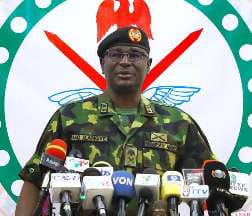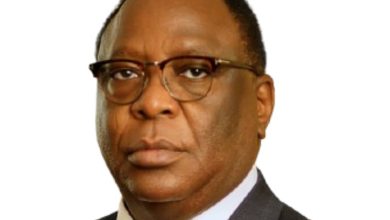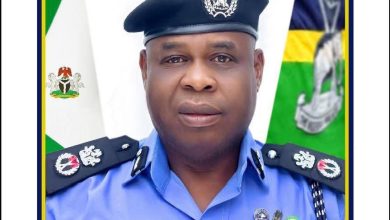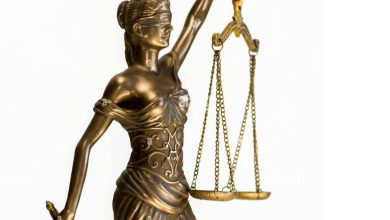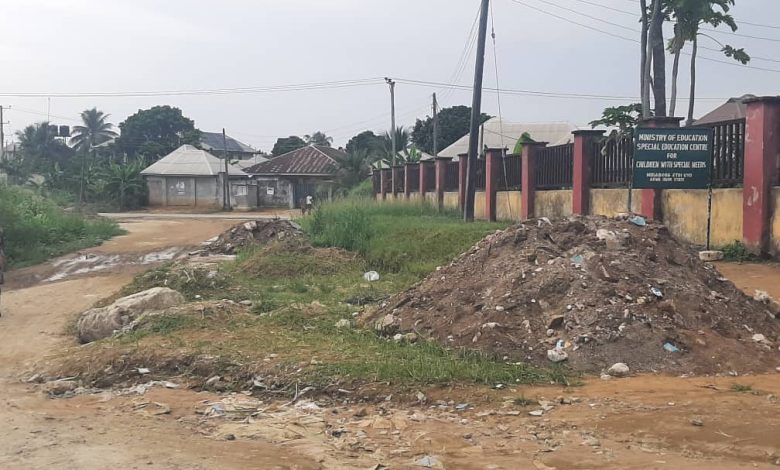
Guided only by the sound of his white cane against the uneven ground to navigate his way, Uduakobong John Bassey, a visually impaired young man bore the burden of walking the untarred Mbiabong Etoi Road leading to his former school.
Despite the road becoming a battleground strewn with obstacles, Uduak pushed on every day with determination to defy the odds stacked against him. Although he has fallen several times due to the uneven terrain, he still got up and moved on. Not even the murky whitish cement remnants of Hensek Construction’s daily operations could obscure his path.
Uduak, 33, fought through the rocky and untarred road, bumping into ditches and stones lying scattered on the road to the school till he completed his secondary school education at the Special Centre before proceeding to sit for the 2024 Joint Admission and Matriculation Board, JAMB.
Few metres from the school gate lie heaps of abandoned chippings which obviously have been there for months or years.
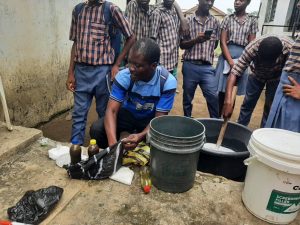
This is the daily travails Uduak and other visually impaired and physically challenged students go through accessing their school which is a few minute walk from the popular Udo Udoma Avenue. The school, Ministry of Education Special Education Centre for Children with Special Needs, Mbiaobong Etoi is beside the Dakkada Secretariat and shares landmark with the Independent National Electoral Commission, INEC; Ibom Recreational Centre, Tropicana and other prominent places including the Shelter Afrique Estate.
‘’Have you seen how bad this road is? I’ve fallen on this road several times even my classmates who are visually impaired but I’m not deterred. This is the price I have to pay for pursuing my education. We fall and get up because our dream is more important than this bad road. You see the things this company dumped on the road to our school, it’s not helping, couple with the bad road. When it rains, the road floods and we fall anyhow,’’ Uduak said with a carefree smile as though he isn’t fighting this everyday ordeal, even as an ex-student of the school.
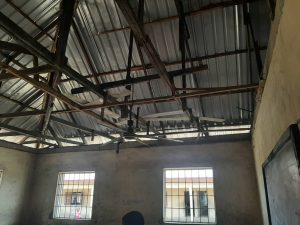
Uduak was not born blind. He became blind while schooling at Secondary Commercial School, Ibekwe, Ikot Abasi in 2006 when he was 15 years old, weeks after killing a spider that entered his left ear while playing with his friends outside. Weeks later, the incident led to him becoming blind, paralysed, deaf and dumb. He later recovered from other challenges but never regained his sight as he was diagnosed with glaucoma by a medical doctor.
He believes his condition isn’t medically meditated but spiritual and hopes to regain his sight one day. Despite the daunting task bedeviling him, he equally hopes to become a lawyer some day to inspire other people with disabilities to chase their dreams.
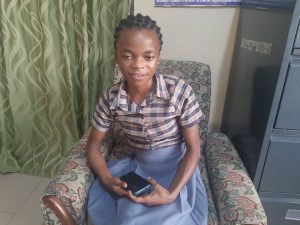
In pursuit of that dream, he relocated with his now late father to Uyo, Akwa Ibom State capital where they lived after he lost his mother.
He later found out there is education for the blind when his late friend invited him for the white cane day celebration in Ikot Ekpene Local Government Area, an annual event celebrated to raise awareness for blind people.
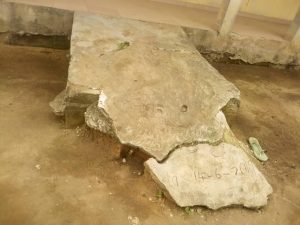
In 2019, precisely on October 10, he decided to take a chance at fate by enrolling at the Special Education Centre, Uyo where he began his rehabilitation program which is a compulsory requirement for admission. During one of the intervention programs carried out by some missionaries, he learnt how to make home use detergents, a skill he passed on to his successor, the new head prefect of the school and other students.
After graduation, he ventured into entrepreneurship by selling doughnut, fried groundnut, detergent, perfume and anything his hand could find in other to become financially strong to pursue his dream.
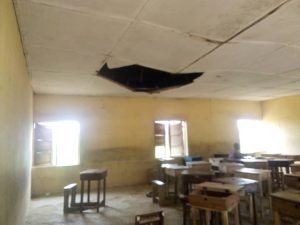
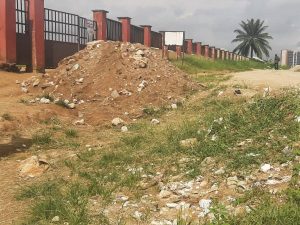
“When I look back and I don’t see my father alive, I don’t see my mother alive. And I see myself as a visually impaired person. I see education as the only source of livelihood for me. Education ultimately is the only way that can catapult me to the pinnacle of my life.
“I summoned courage, believing that before you achieve your goals, you must definitely face challenges in life. One thing I believe in life is if you don’t believe in yourself, which is the first step to achieving success, then you are bound to fail. And also, poor background has motivated me to make it.
“I equally want to right the wrongs of so many people about the perceptions that people are having in the society about persons with disability, that even if you are disabled, your disability has nothing to do with your ability. And that is why I prefer the public to address us as persons with special ability.”
Students With Disabilities Stuff In Crowded And Poorly Equipped Classrooms
The United Nations’ Sustainable Development (SDG) Goal 4 and 10 advocates for quality education and reduction of inequality by ensuring citizens are given economic, political and social inclusion, including persons with disabilities. Also goal 11 advocates that cities and infrastructures should be made inclusive, safe, resilient and sustainable for all citizens.
A 2020 report by the National Bureau of Statistics states that Akwa Ibom State has an estimated 270,000 children with disabilities who are in need of basic education, but only 10,000 are currently receiving some form of education.
NBS report also revealed that Akwa Ibom State had the second-highest number of out-of-school children after Kano State which had 989,234, with a staggering 581,800 children, and a significant number of girls not having access to education.
Investigation by these reporters revealed that some of the factors challenging access to inclusive education in Akwa Ibom are lack of well funded special schools, special teachers, outdated libraries, learning materials for the visually impaired, accommodation, bad road leading to school, broken desks, dilapidated ramps, lack of sign language interpreters and feeding for those in boarding house.
A few classroom blocks served both primary and secondary school students, including those with disabilities in the Special Education Centre. The ceiling of the classes was broken, with faulty and rusty ceiling fans. The windows and doors of the classrooms were visibly broken, and the ramps for physically challenged students were washed off and roughly patched with ditches, posing a real struggle for students in wheelchairs who have to rely on their friends for assistance.
The walls and roof of the few blocks donated by Maltina, NPDC, FEYReP, and some organizations had been eaten away by termites, including the Principal’s office, which was visibly under attack. The doors of the toilet facility beside the SS1 block had fallen due to poor construction and no longer served the students.
The football field was overgrown with tall grass, and only one swing served the entire school. Teachers in the school taught with chalk and wrote on blackboards for students, including the visually impaired ones even for science subjects. The floor of the refectory constructed by the former First Lady, Dr. Martha Udom Emmanuel, in 2016, had broken, and the fan regulators were spoilt and no longer in use.
These reporters were not allowed access into the hostels, laboratories, and libraries, but from the building’s exterior, it was clear that the hostels were poorly equipped, with broken bunks heaped outside the male hostel and surrounding areas.
Despite having only a handful of sign language teachers, students in the school had taken it upon themselves to learn how to sign in order to communicate with their mates who had disabilities.
Data from Joint National Association of Persons with Disabilities (JONAPWDS), reveals that Akwa Ibom State has 7 special public and private schools and learning centres for children with disabilities. The enrolment capacity which stood at about 2000 pupils as at 2014 is yet to be updated both on the official website of the State government.
The Free and compulsory education policy was introduced in 2008 under the Godswill Akpabio’s administration. Some of the provisions reportedly made by government were 100% funding of education through subvention of N100 per primary school pupil and N300 per secondary school student to cater for logistics and expenses. Others were rehabilitation, reconstruction of schools, provisions of hostels, supply of desks, textbooks, equipping of laboratories, and payment of SSCE examination fees for all students.
In spite of successive governments’ effort to sustain the policy, the policy has fallen short of UN’s standard for quality education as disability students in the school still learnt in overpopulated classrooms with broken desks and termites infested walls.
Budget Provisions For The Special Education Centre Fall Short
Despite its dilapidated nature and need for infrastructure development, the Special Education Centre in Mbiabong Etoi, Uyo, has continued to receive inadequate budget provisions in recent years.
In 2020, the centre received N1,000,000 for a workshop on new pedagogy in special education, N2,000,000 for instructional materials, and N20,000,000 for student welfare and feeding.
Additionally, N750,000 was approved for the purchase of double bunk beds and N1,000,000 for mattresses and pillows.
However, several projects earmarked for the year, including the construction of an examination hall, classroom blocks, and staff quarters, received no provisions or releases.
In 2021, the centre received a paltry N12,700,000 out of the Ministry of Education’s total budget of N4,856,830,010.
Similarly, in 2022, N12,700,000 was allocated to the centre, with no capital projects earmarked for its development. The Ministry of Education spent N8,298,998,370 on capital projects that year, but none benefited the special school.
In 2023, the centre again received N12,700,000 out of the Ministry’s total budget of N53,781,129,960, with no capital projects allocated to it. The 2024 budget has also failed to include any capital projects for the school, despite its pressing needs, with the Ministry of Education receiving a total allocation of N1,612,177,080.
Outdated Libraries And High Cost Of Learning Materials Creates More Gaps
Findings by these reporters showed that students with disabilities in the Special Education Centre in Uyo still use outdated specialized materials and faced financial constraint of buying updated ones which cost hundreds of naira.
The blind pupils require specialized materials to learn, including stylus and slate, Braille embosser and printer, and Braille note taker. The stylus and slate, similar to pens or pencils used by sighted individuals, enable the blind to create characters with raised dots or bumps on paper.
A Braille embosser, is an impact printer, transfers Braille characters from a computer onto paper using translation software with relative ease of reading for the blind.
However, the cost of a Braille Alphabet Board with raised dots cost N74,429. While Braille embosser which remains a significant barrier to inclusive education cost N5,464,400 at current market exchange rate of N1,520.67 per US dollar ($3,595.00).
In addition, a Braille writing pad cost N21,000 while Braille notetaker which is a portable device equipped with a word processor, internet connectivity, and various software applications, enabling blind pupils to perform diverse tasks. It also features in-built refreshable Braille displays. Unfortunately, the cost of a Braille notetaker has increased over time, from $3,500 to $5,795 (approximately N8,808,400).
Unfortunately, these gaps are clear violations of the Universal Basic Education Law of Akwa Ibom State (2005) and the Child Rights Law (2008) that mandates government to ensure children have access to free and inclusive education.
Section 5 and 7 of the Law states that government shall provide adequate funding for the implementation of this law while the State government shall ensure all public primary and junior secondary schools have adequate infrastructure including classrooms, furniture, and water supply.
Also the Child Rights Law of Akwa Ibom State (2008), Section 15 (1) states that every child has the right to free, compulsory, and universal basic education, and it shall be the duty of the Government of Akwa Ibom State to provide such education.
Further provisions of the law states in Section 15 (2) that the Government of Akwa Ibom State shall ensure that all children have access to quality education, including children with disabilities and special needs. Section 16 states that the State Government shall establish and maintain special schools and units for children with disabilities and special needs while Section 17 states that the State Government shall ensure that all schools have adequate facilities and resources to cater to the needs of children with disabilities and special needs.
Bleak Inclusive Education For Students With Disabilities Pose More Gaps
The inadequate infrastructure in place have left students with disabilities in the school at their own mercy. Uboho Ime, a visually impaired SS2 student and Head Girl of the inclusive school at Mbiabong, recounted the ordeals she has to pass through everyday in pursuit of education.
Uboho, 20, who dreams of becoming a Journalist revealed the mounting challenges she faces in the learning environment.
“Writing materials is one of the problems I face in school and since my first day in SS2, I have not written any notes in a block pen, I only record the notes in my recorder.
For some teachers, when it’s time to submit notes. They are like, bring your notes for checking. I will just tell them, Sir, please. I do not write them down in my notebook.
“Another challenge we have is insufficient time to access some braille textbooks in the library, the textbooks are just there. Sometime you want to take the textbooks home but the teacher will insist that we stay in the library and read.
“These are Braille textbooks and we don’t use our eyes to read. You have to take time to search the contents to know what to do and where to read and this takes time. But the teacher will insist that we stay there in the library to read. How many minutes will we spend in the library, whereas class is going on? Uboho lamented.
Despite the challenges, Uboho said with excitement that she is happy to be in school and also leading the students as well.
“It makes me feel happy to be in school because people in the society feel that when someone becomes visually impaired, that person cannot do anything, being able to lead the students in school means that there is something in me and I can do what others cannot do.”
Another student, a physically challenged students in SS1, Joy Kingsley confined to an old rusty wheelchair in the school premises narrated with heavy heart the hurdles she passes through to access education.
Miss Kingsley, who is an orphan with no known relative, lives in the school hostel during school session and on holidays. The young girl who had earlier dreamt of becoming a medical doctor but had a change of mind because her peers and some teachers discouraged her against becoming a medical doctor, lamented how she is most times left to fend for herself alone in the hostel although she has friends who help her in their own little way.
Among the numerous challenges facing the school, the Principal, Mrs. Ememabasi Isaac revealed the school has a student population of 1920, with an average of 50 students per class, who are in dire need of more teachers, particularly sign language interpreters, mathematics, physics, and science teachers.
“We need more teachers to employ so that our students can have quality education.
“We have only five sign language interpreters, which is grossly inadequate for our hearing-impaired students. We also need more mathematics and physics teachers, as most of the teachers posted to us by the state educational secondary board specialize in biology or basic science,” she lamented.
Decrying lack of infrastructure in the school, including the termites-infested buildings, inadequate library facilities, and lack of power supply, she said, ”The school needs a general overhauling of its electrical system.
“Most of the students who have special needs did not go to school on time as most of them are adults in the minor classes, so the quantity of food you would have given to a minor like 15 or 16 years, you are now giving it to someone who is 22 years old, so this is a challenge.”
“We have young students coming all the way from Eket, Nsit Ubium, ONNA, among others, looking for school accommodation and this is the real age we should take them in but we can’t because we have only 100 space, 50 for males while 50 for females, so we need more accommodation.
“We appeal to the state Universal basic education to provide an accommodation so that there will be a separate accommodation for the primary session because it is absurd for you to mix the infants with an adults,” she added.
A Special teacher, Elder Imo Essien lamented how despite government’s promise of free and compulsory education, students with disabilities are left behind due to a lack of resources, inclusive environments, and insensitive policies.
Essien who shed light on the struggles these students face and the need for change said, “The society is not inclusive. The schools are not inclusive. There should be provisions for inclusive classrooms, inclusive school environments, inclusive everything, so that every child can have an inclusive experience.”
Students with disabilities, such as visual and hearing impairments, physical challenges, and intellectual disabilities, are often forced to learn in non-inclusive environments, making it difficult for them to succeed. The lack of resources, including assistive technology and trained teachers, exacerbates the problem.
“As a teacher of persons with special needs, we have problems, the physical problems, because one, the society is not inclusive. The schools are not inclusive. Because if your school, if you’re looking at inclusiveness, there should be provisions for inclusive classrooms, inclusive school environments, inclusive everything, so that every child that is there would have gone through an inclusive everything. But here, no inclusive school compound, no inclusive classroom, no inclusive buildings.”
Elder Imo Essien, who has taught in both Nigeria and the United States and won Maltina Teacher of the the year award in 2016 highlights the stark contrast between the two education systems.
“In the US, every student has access to technology, including Chromebooks and interactive boards. In Nigeria, we don’t have these resources, making it harder for students to learn.”
The situation is further complicated by the government’s lack of commitment to providing support for students with disabilities. “There are no provisions for out-of-school children with disabilities. They are left to beg on the streets, and eventually, they drop out of school,” Essien laments.
Despite these challenges, Elder Imo Essien remains committed to making a difference in the lives of students with disabilities. “As a teacher, I have been able to transfer myself into somebody else’s life. That’s one of the satisfactions I get. When I see my students go on to achieve great things, I am proud.”
Akwa Ibom State Curriculum Not Inclusive For Students With Disabilities – Expert
A practicing psychologist and teacher, Udemeobong Akpan, stated that “our current curricula and syllabi don’t take into consideration students with learning needs.
For instance, I have 2 dyslexic students who are always struggling to fit into the mainstream system. It’s a struggle for both the students and the staff, because it doesn’t meet them at the point of their needs. It’s the same effect for students with physical disabilities such as hearing impairment. A blind student shouldn’t have to take the same test, written on the board, or typed out on paper, like a student who has no visual impairment.
According to Akpan, the current education system fails to meet the needs of students with learning difficulties, physical challenged, and other special needs.
“Inclusive curriculum, continuous assessment methods, employment of SEND teachers and specialists, and funding for accessible infrastructure and learning aids are crucial to enhance inclusive education. Funding is also critical to provide accessible infrastructure and learning aids, such as Braille, hearing aids, and speech-to-text software to help alleviate the struggles for both students and teachers,” Akpan added.
Government Has Failed To Implement Inclusive Education Policy – Social Inclusion Advocate
The lack of implementation of inclusive education has further exacerbated the plight of students with disabilities in public schools. Although the policy was introduced in 2016 and 2018, Joy Ubong, a Social Inclusion Advocate for Persons with Disabilities, stressed that the gaps in implementation has resulted in students with special needs being denied access to quality education.
Inclusive education, Joy explained, provides students with the opportunity to learn sign languages and interact with other clusters of disabilities without any form of discrimination.
“Many schools in the state lack basic facilities such as ramps for wheelchair users and sign language teachers for students with hearing impairments.
“My sister does not have any disability, but she is schooling in an inclusive school and she can sign perfectly and communicate with other people who have disabilities. It gives the students the opportunity to learn sign languages and interact with other clusters of disabilities without any form of discrimination.
To make institutions inclusive, Joy advocated for the reformation of school buildings to include ramps for wheelchair users, employment of sign language interpreters for deaf students, training teachers on how to handle students with special needs, and providing braille materials for visually impaired students in the library.
“We don’t need special schools, but an inclusive one to show that we are all human beings and we can interact together and blend together,” she said.
Commissioners Go Mum, Governor’s Aide Assures Plan are on headway
The Akwa Ibom State government has implemented measures to ensure inclusive education for students with special needs,
Comrade Ubong Ikpe, the Personal Assistant to the Governor on Persons with Disabilities revealed.
According to Ikpe, government has embarked on various projects to enhance the inclusive learning policy in select schools across the state and one of the beneficiaries of this policy is the Special Education School at Mbiaobong Etoi.
He added that government has renovated Christ the King School (CKS), Wellington Bassey Way, Uyo to be inclusive and provided a 100 million naira educational intervention for students with disabilities in tertiary institutions.
However, efforts to reach the Commissioner of Education, Mrs. Idongesit Etiebiet, and the Commissioner of Women and Social Affairs, Dr. Ini Adiakpan went mum, as they did not respond to calls or messages seeking information on the state government’s efforts to address the challenges facing inclusive education at Mbiaobong Etoi.

